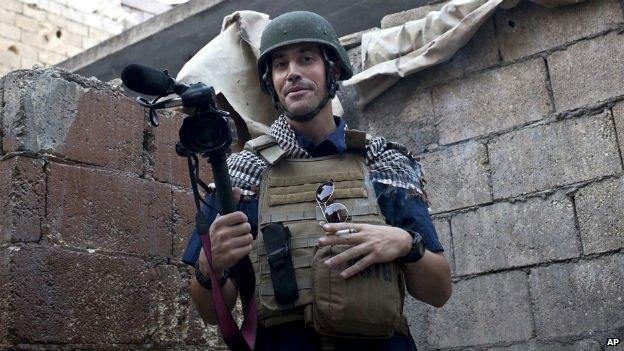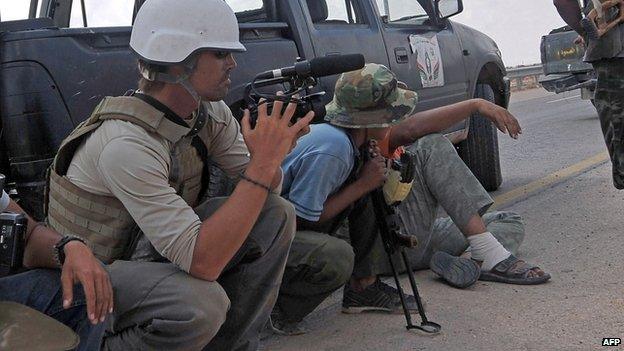Experts warn of trauma after watching Foley death video
- Published

James Foley was abducted in Syria in November 2012
A video of the violent death of James Foley, the American journalist who was killed by Islamic State militants, is difficult to avoid.
It is being shared widely across social media, and screenshots have made it on to the front pages of international newspapers.
There have been calls for a media blackout, and some are now encouraging the sharing of more positive photographs and memories instead.
But for those who purposely seek out the video, or who witness the images unwittingly, what are the likely psychological effects?
Neil Greenberg, professor of defence mental health at King's College London, says the key issue is whether you choose to view the images or whether they are forced upon you.
Those who make that decision are more likely to cope with what they see, as most people are good judges of what they can deal with, he says.
But anyone who finds them popping up unexpectedly in their Twitter or Facebook feeds is at more risk of harm.
It is well known that people, such as security forces and journalists, who deal professionally with horrific events can suffer serious conditions as post-traumatic stress disorder.
This is not a common problem, but there is a well-known risk it can happen and does affect members of the public too, Prof Greenberg says.
And the impact on people who live with these horrors everyday can be enormous.
But for the majority who view such macabre images less frequently, the strength of the impact may hinge on what the pictures mean to the individual.
Those who feel these events resonate with their world view are much less likely to experience long-term harm.
Greater threat
"If you already think the world is a horrible and unfair place, these types of images may cause temporary shock and distress but it is likely they will fade away and you will move on," Prof Greenberg says.
But a few people will go on to think about them deeply, and if this changes how they feel about the world there is a greater threat of psychological problems.

James Foley (in the white helmet) was reporting in Libya when he was first captured in 2011
Dr James Thompson, a psychologist at University College London who has worked with people who have experienced severe trauma, told the BBC: "There is a history of people being enticed to witness gruesome events with a mixture of grisly anticipation and loathing.
"But there is a lot of data suggesting people can be traumatised by watching unpleasant things.
"I started to watch it but I didn't want to see the whole thing. It is very possible people will be disgusted and frightened and see people in a different light."
And there are certain factors that can increase the chances of becoming ill when exposed to any type of traumatic incident.
For example, current or previous mental health problems could affect someone's response - and individuals going through personal, social or financial difficulties can be more vulnerable to harm.
Prof Greenberg says having a good social support network can be crucial in protecting people dealing with disturbing scenes.
He adds that the number of people who are likely to feel long-term distress and experience frank illness from these images is small but individuals who do should speak to others about their concerns.
If their feelings persist they should seek medical advice.
GPs, for example, may be able to offer referrals for counselling and other psychological therapies.